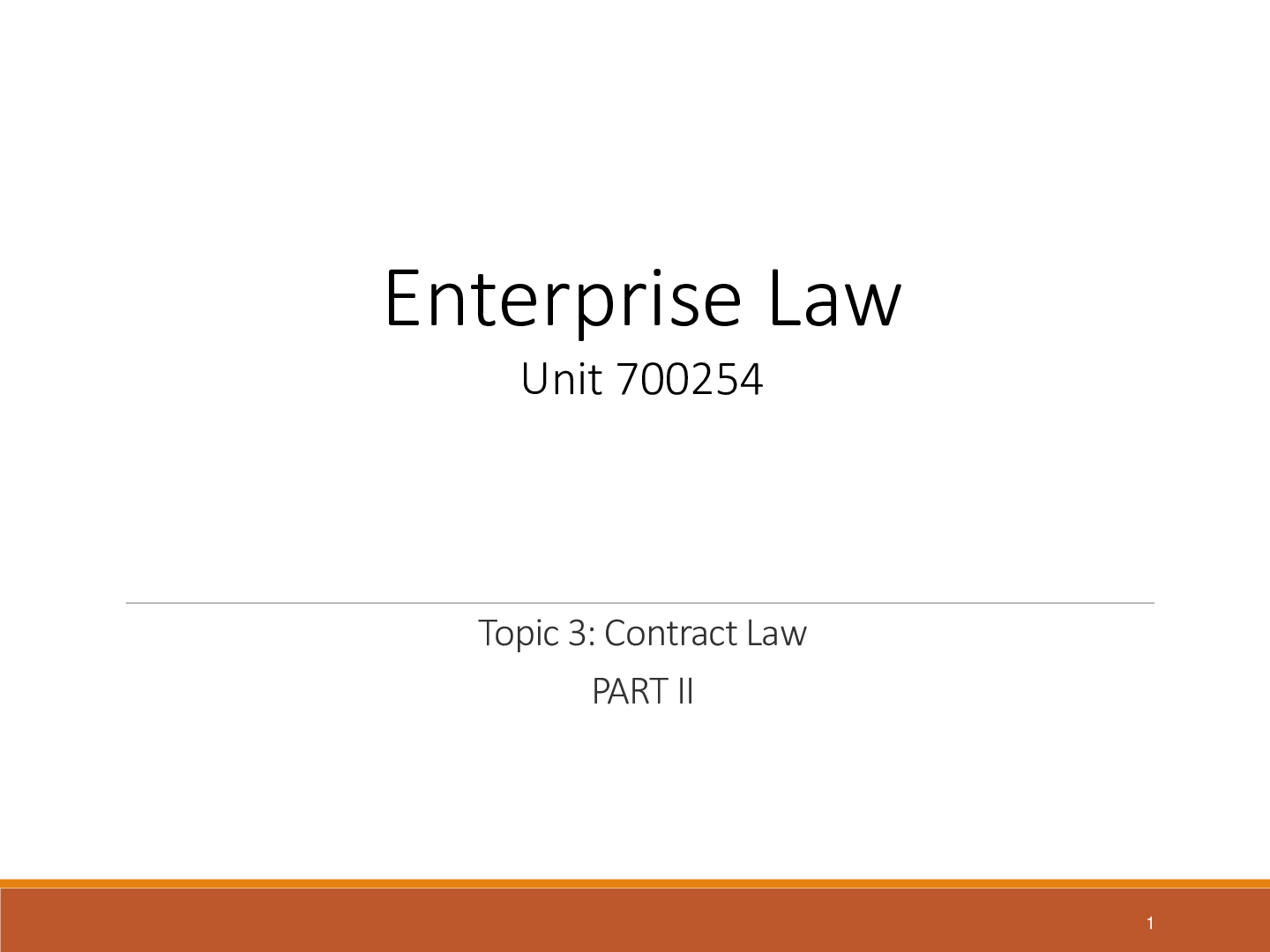Enterprise Law > Study Notes > Enterprise Law Unit 700254: Topic 3: Contract Law PART III (All)
Enterprise Law Unit 700254: Topic 3: Contract Law PART III
Document Content and Description Below
Topic 3: Contract Law PART III Enterprise Law Unit 700254 1Topic outcomes On completion of this topic, you should be able to: ◦ explain the concept of ‘privity of contract’ ◦ recognis... e and explain the methods by which a contract is ended, including: ◦ By performance ◦ By agreement ◦ By frustration ◦ By breach ◦ understand the remedies available to the plaintiff for breach of contract 2Privity of contract ◦ As a general rule, only the parties to the contract can take action for breach of contract: ◦ Lumley v Gye (1853) 3Lumley v Gye (1853) 118 ER 749 Wagner, a well known opera star, had been engaged by Lumley to sing exclusively at the Queen’s Theatre in London for a three month season. Before the start of the opera season, Gye persuaded her to break her contract and sing for him at another theatre. Lumley successfully obtained an injunction to stop Wagner from singing elsewhere and also attempted to sue Gye for damages. No right of action in contract generally exists against a person who is not a party to a contract. In this case, however, the court held that Gye’s intentional and unjustified actions in inducing Wagner to break her contract with Lumley amounted to a direct and malicious interference with contractual relations and that an action in tort was available against him for damages for inducing the breach of contract 4Discharge by Performance ◦ The most common way of discharging a contract ◦ To discharge the contract by performance the parties must carry out as closely as practicable the terms of the contract: ◦ Re Moore & Co Ltd and Landauer [1921] ◦ cf Shipton, Anderson & Co v Weil Brothers & Co [1912] 5Re Moore & Co Ltd and Landauer [1921] 2 KB 519 An order was placed for tins of canned fruit to be delivered in cases of 30 tins per case. When the goods arrived, the correct quantity was delivered, but half of the cases contained 24 tins. As the fruit was not packed in the manner stipulated by the contract, the buyer could reject all of the goods should he wish to do so. The manner of packaging was an essential part of the contract description. Whilst this may seem a trivial matter, it may be that storage costs were a factor, with 24-tin cases costing more to store than 30-tin cases. If the product had a low profit margin, extra costs may turn a profit into a loss. 6Shipton, Anderson & Co v Weil Brothers & Co [1912] 1 KB 574 Under a contract for the sale of 5,029 tonnes of wheat, the supplier sent 25 kg too much. They only claimed the contract price, but the buyer attempted to reject the whole shipment, arguing that the shipment did not satisfy the exact contract requirements. The Court held that the variation was so trivial that it should be ignored and so ordered the buyer to accept the shipment. Unlike Re Moore’s case, space wouldn’t be an issue given the size of the order. 7Discharge by agreement A contract created by agreement can be undone by agreement: ◦ Mutual Discharge where both parties abandon their original agreement while the contract is still “executory”; ◦ Release/unilateral discharge where one party has performed their obligations and releases the other from completing performance of their obligation. ◦ Must have consideration or be in the form of a deed ◦ . 8Discharge by agreement ◦ Waiver ◦ One party leads the other party to reasonably believe that strict performance will not be insisted on. ◦ Promissory estoppel. ◦ Substitution ◦ Where the parties wish to continue with a contractual relationship, ◦ but on terms differing from those in the original agreement, ◦ a new agreement can be substituted. ◦ they were bound to do under the original contract. 9Discharge by agreement ◦ Accord and satisfaction Where one party has performed their obligations, ◦ And, by agreement (accord), ◦ the defaulting party is relieved of their obligations by doing something different (satisfaction) to that which was agreed. 10Discharge by frustration Frustration can only arise where: 1. an unforeseen event outside the control of the contracting parties has significantly changed the obligations of the parties from their original intentions; 2. neither party caused the supervening event; and 3. neither party contemplated the supervening event; and 4. the new circumstances would make it unjust to hold the original parties to their original contract. 11Discharge by frustration ◦ Cases involving this doctrine fall into five categories: 1. physical impossibility because of destruction of the subject matter (Taylor v Caldwell (1863) 122 ER 309); 2. physical impossibility under a contract of personal services; 3. a change in the law rendering performance impossible (Horlock v Beal [1916]); 4. impossibility due to the non-occurrence of an event basic to the contract (Krell v Henry [1903]); 5. where the particular state of affairs ceases to exist (Codelfa Construction Pty Ltd v State Rail Authority (NSW) [1982]) 12Taylor v Caldwell (1863) 122 ER 309 A building had been hired to Taylor, who wished to hold a concert there. Before the date of the concert, the hall was destroyed by fire. The hirer claimed damages against the owner for his failure to complete his part of the agreement. The contract was frustrated because there was a reasonable expectation that the contract was based on the continued existence of the music hall. Had the hall been burnt down without the knowledge of either party whilst they were still negotiating, and they subsequently entered into a contract it would be void ab initio for a common mistake. 13Horlock v Beal [1916] AC 486 Horlock was a seaman on one of Beal’s ships, which was detained in a German port at the outbreak of WW2. Horlock’s wife sued Beal for the wages due to her husband under the two-year contract. Her claim failed, as the capture and holding of the ship by the Germans amounted to a frustration of the contract, which made performance impossible. Note that, if intervening events make the performance of the contract less convenient or more costly, the Courts will not be prepared to allow a plea of frustration to succeed because the contract will still be possible. 14Krell v Henry [1903] 3 KB 740 Henry hired a room from Krell for the purpose of watching the coronation procession of King Edward VII. The procession was postponed because of the illness of the King, but Krell claimed the rent of the room. As it was no longer possible to achieve the substantial purpose of the contract, that is, to watch the procession, the contract was frustrated by the non-occurrence of the event. As the contract was for hire of a room, what difference did it make whether there was a procession or not? 15Codelfa Construction Pty Ltd v State Rail Authority (NSW) [1982] 149 CLR 337 Codelfa entered into a contract with the NSW SRA to excavate an underground railway tunnel for the Eastern Suburbs rail link in 130 weeks. To achieve this, both parties were aware that Codelfa would need to work 24/7, however the noise and vibrations were so great that local residents obtained an injunction to restrict the amount of noise at night and reducing the working week to 6 days. This caused Codelfa extra costs and a loss of profit. The contract was treated as frustrated by the injunction because of the fundamental change of circumstance which forced a radical amendment to operations. Codelfa was entitled to a claim of quantum meruit. Frustration will not occur in instances where: 1. the contract specifically provides for the change in circumstances; 2. the change in circumstances was reasonably foreseeable; 3. the change in circumstances was self-induced. 16Discharge by breach ◦ Where one party fails to perform their obligations as agreed they are liable for breach of contract. ◦ Breach may be: ◦ Actual breach ◦ Where a party fails to perform at the time required by the contract. ◦ Anticipatory breach ◦ Where a party threatens not to perform prior to the time required by the contract. ◦ See Foran v Wight [1968] HCA 51. 17Foran v Wight (1968) 168 CLR 385 A contract for the sale of land included a ‘time is of the essence’ clause. Two days before settlement date the vendor’s solicitor advised that settlement would have to be postponed. On the due date, settlement as specified in the contract did not take place. The purchaser signed a notice of rescission on the settlement date, rather than on the anticipatory breach 2 days earlier. As happens, the purchasers were unable to obtain finance and did not tender performance of their side of the contract on the settlement date. Even though the purchasers were not able to complete on the agreed date, the notice given by the vendor 2 days earlier of non-performance of an essential term amounted to an anticipatory breach and entitled the purchasers to rescind. They were also able to recover their deposit as consideration had wholly failed. 18Discharge by breach The effect of breach depends on the importance of the term that is broken. ◦ If one party indicates that they will not be performing their part of contract prior to time of performance: ◦ the innocent party can immediately treat the contract as at an end and sue for breach; and ◦ there is no need to wait until the actual breach occurs. ◦ Under the ACL, remedy is determined according to whether the problem is a minor or major failure. 19Remedies at common law Termination ◦ Does not require the intervention of the court. ◦ Termination is only available for breach of a condition. ◦ Not available for breach of a warranty. ◦ It releases both parties from future performance but rights and obligations arising prior to termination are enforceable. 20Remedies at common law Termination ◦ The injured party can elect either to affirm the contract or accept the breach and bring it to an end by terminating. ◦ If the injured party elects to terminate the contract, it must be made clear by words or conduct to the other party; ◦ The innocent party also may sue for damages. 21Remedies at common law Damages ◦ The main remedy under contract law. ◦ Damages are a common law remedy and awarded as of right. ◦ Purpose is to compensate for loss rather than punish by placing the injured person in the position they would have been in had the breach not occurred, and if the contract had been performed as originally intended. 22 ::::::::::::::::::::::::::::::::::::::::CONTENT CONTINUED IN THE ATTACHMENT::::::::::::::::::::::::::::::::::::::::::::::::::: [Show More]
Last updated: 2 years ago
Preview 1 out of 45 pages

Buy this document to get the full access instantly
Instant Download Access after purchase
Buy NowInstant download
We Accept:

Reviews( 0 )
$3.00
Can't find what you want? Try our AI powered Search
Document information
Connected school, study & course
About the document
Uploaded On
Sep 30, 2020
Number of pages
45
Written in
Additional information
This document has been written for:
Uploaded
Sep 30, 2020
Downloads
0
Views
103

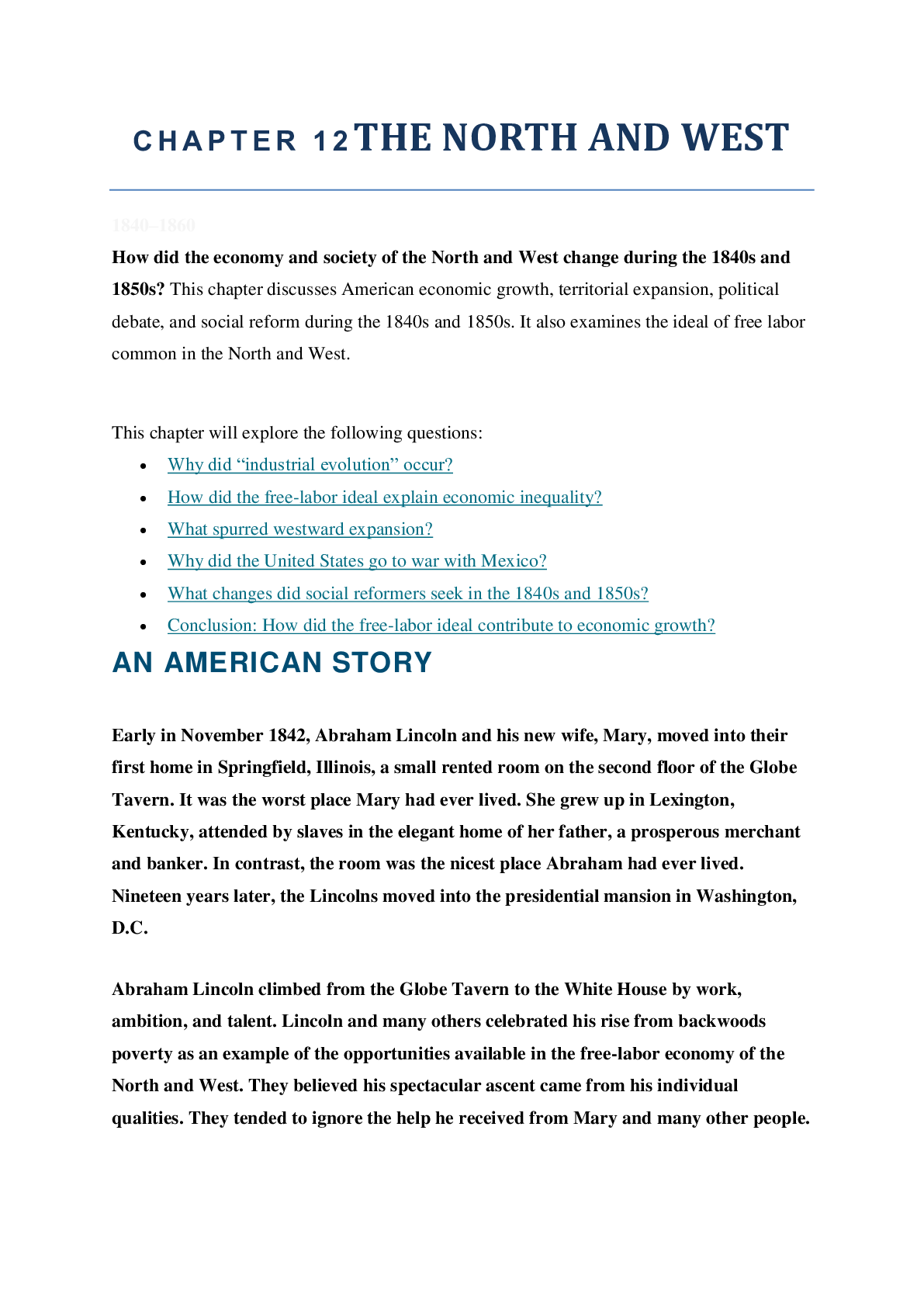


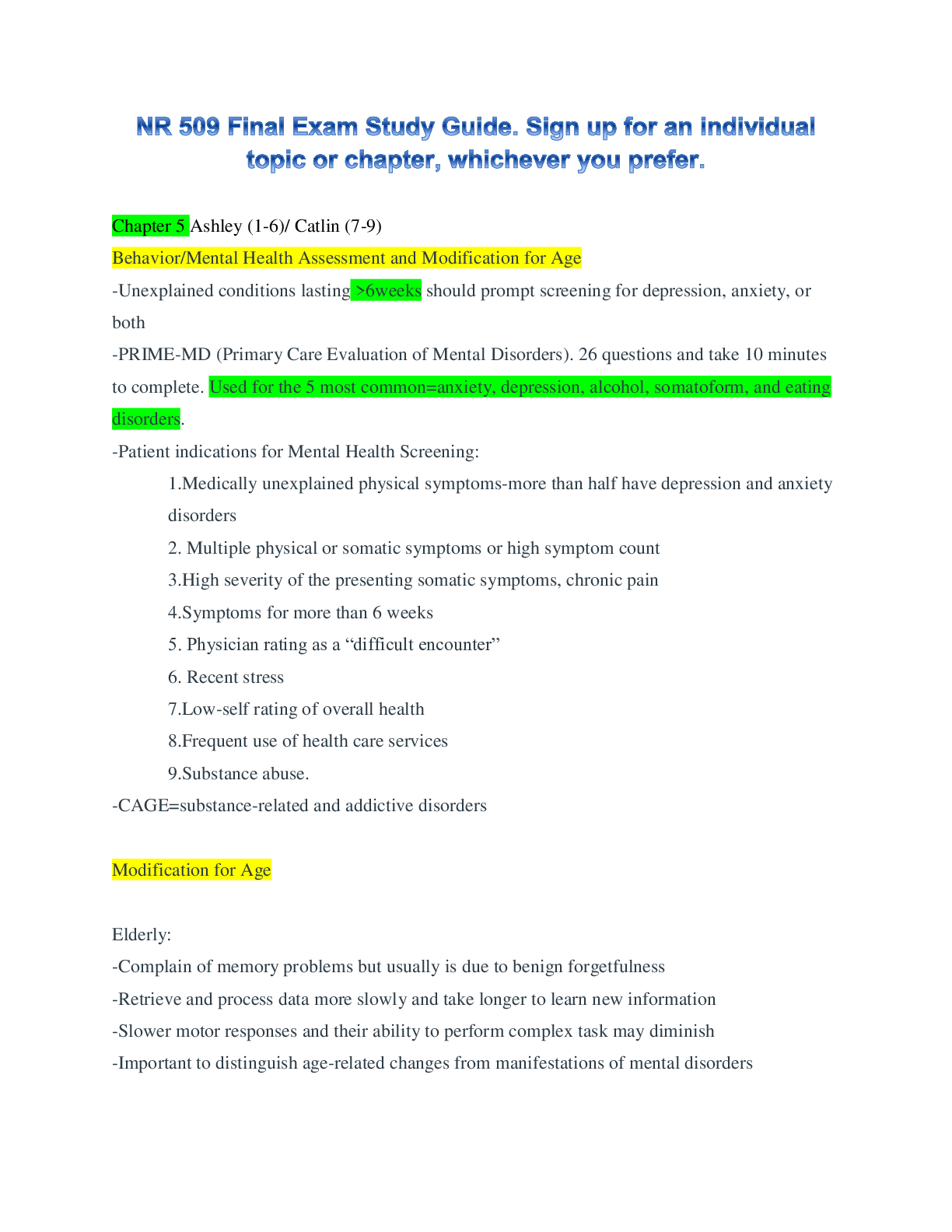

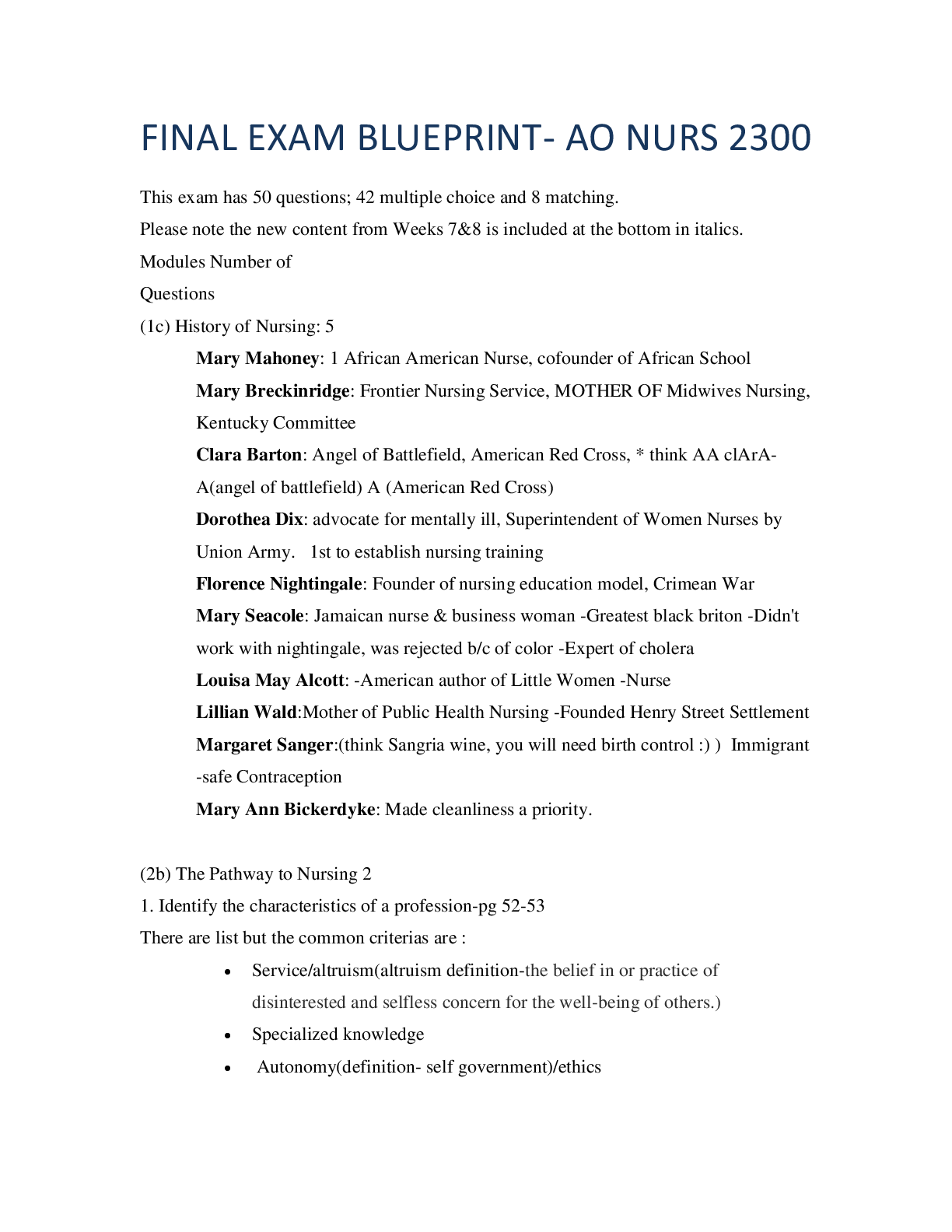
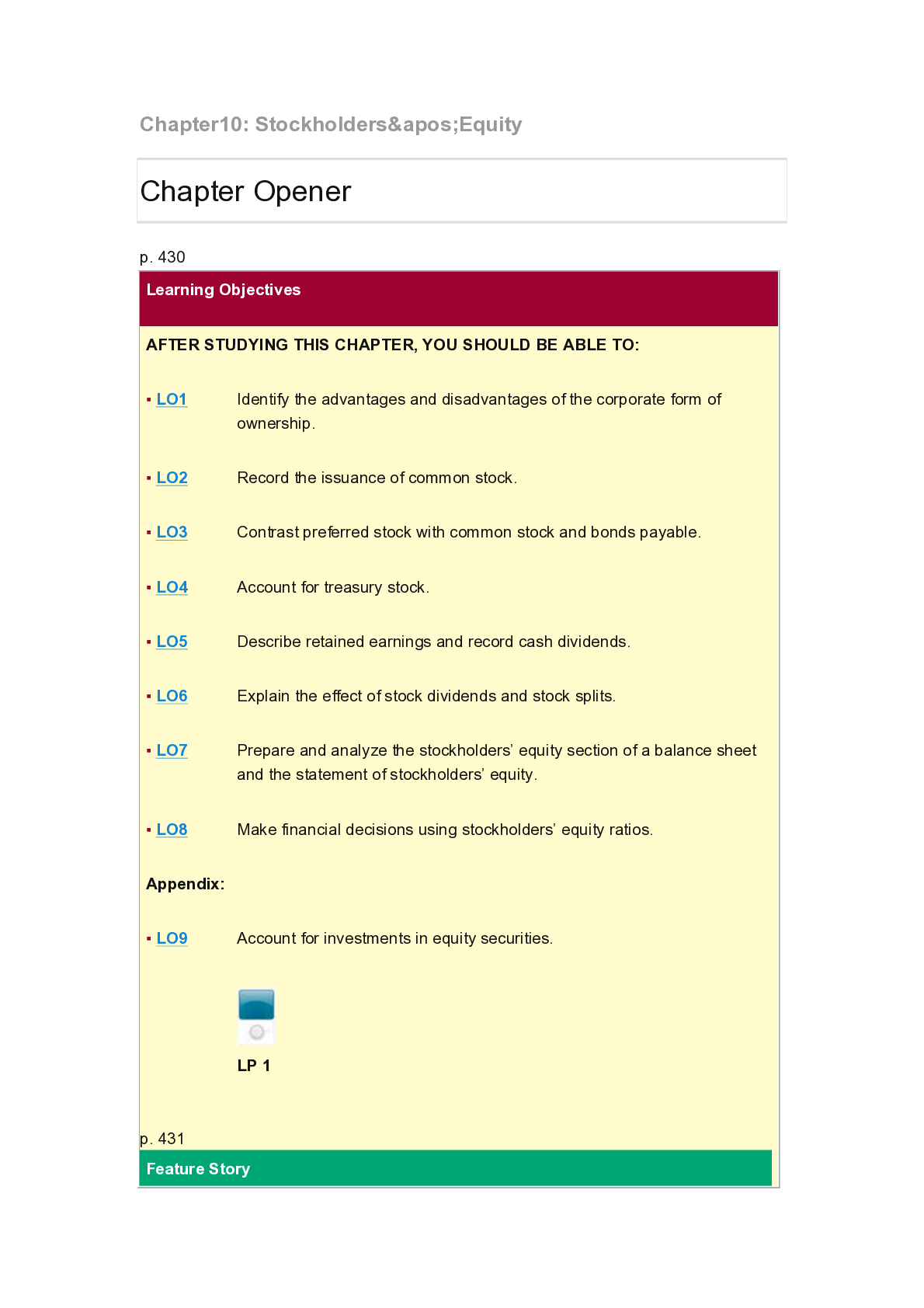


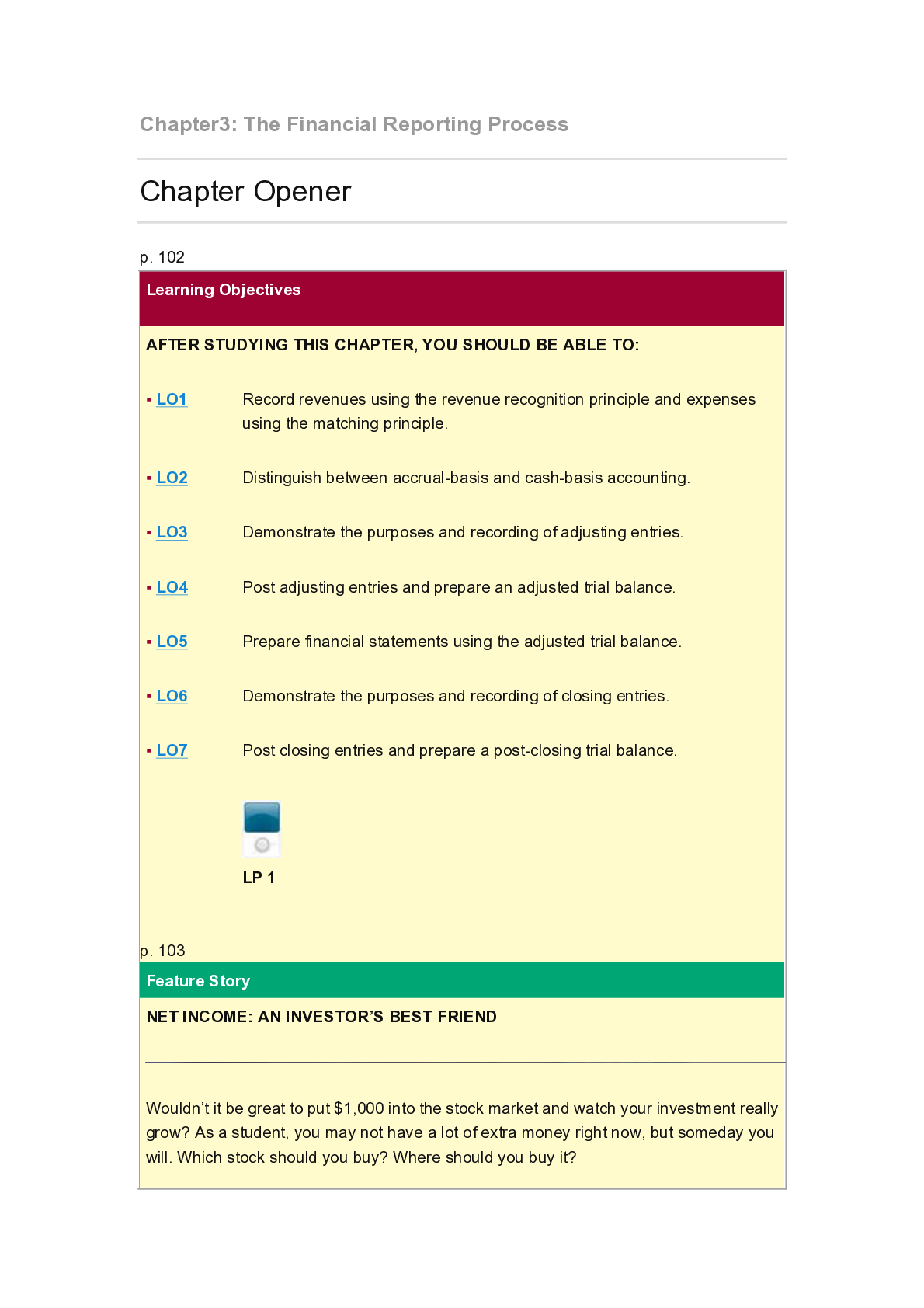




.png)


